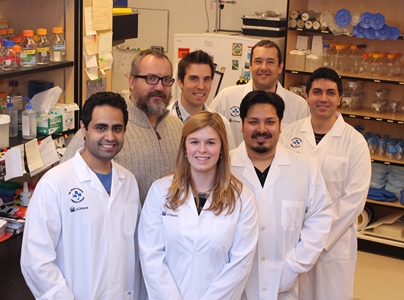 More than 17 percent of Canadians have been diagnosed with high blood pressure, a condition that makes it more difficult for the heart to pump blood around the body. At first, heart muscle grows to meet the challenge, but eventually this growth becomes dysfunctional, leading to heart failure. New research led by Dr. Lynn Megeney provides crucial insight into what controls the transition from heart growth to heart failure. Good heart growth starts with activation of a protein called caspase 3, which regulates a variety of processes by cutting up other proteins. But if caspase 3 stays active for too long, it cuts up a protein called gelsolin, which results in heart muscle cells becoming rigid and dysfunctional. Blocking the interaction between caspase 3 and gelsolin blocks the bad kind of growth in heart cells and preserves heart function. This research could lead to a novel approach to prevent heart failure. See the Journal of the American Heart Association for details.
More than 17 percent of Canadians have been diagnosed with high blood pressure, a condition that makes it more difficult for the heart to pump blood around the body. At first, heart muscle grows to meet the challenge, but eventually this growth becomes dysfunctional, leading to heart failure. New research led by Dr. Lynn Megeney provides crucial insight into what controls the transition from heart growth to heart failure. Good heart growth starts with activation of a protein called caspase 3, which regulates a variety of processes by cutting up other proteins. But if caspase 3 stays active for too long, it cuts up a protein called gelsolin, which results in heart muscle cells becoming rigid and dysfunctional. Blocking the interaction between caspase 3 and gelsolin blocks the bad kind of growth in heart cells and preserves heart function. This research could lead to a novel approach to prevent heart failure. See the Journal of the American Heart Association for details.
“These are exciting observations and suggest that designing drugs to block caspase cutting of gelsolin may provide an effective means to prevent heart failure,” said Dr. Megeney, senior scientist at The Ottawa Hospital and professor at the University of Ottawa.
Authors: Putinski C, Abdul-Ghani M, Brunette S, Burgon PG, Megeney LA.
Core resources: Proteomics Facility
Funding: Dr. Megeney’s research is possible because of generous donations to The Ottawa Hospital Foundation. This study was also supported by the Canadian Institutes of Health Research and an Ontario Graduate Scholarship.
The Ottawa Hospital: Inspired by research. Driven by compassion
The Ottawa Hospital is one of Canada’s largest learning and research hospitals with over 1,100 beds, approximately 12,000 staff and an annual budget of over $1.2 billion. Our focus on research and learning helps us develop new and innovative ways to treat patients and improve care. As a multi-campus hospital, affiliated with the University of Ottawa, we deliver specialized care to the Eastern Ontario region, but our techniques and research discoveries are adopted around the world. We engage the community at all levels to support our vision for better patient care. See www.ohri.ca for more information about research at The Ottawa Hospital.
University of Ottawa: —A crossroads of cultures and ideas
The University of Ottawa is home to over 50,000 students, faculty and staff, who live, work and study in both French and English. Our campus is a crossroads of cultures and ideas, where bold minds come together to inspire game-changing ideas. We are one of Canada’s top 10 research universities—our professors and researchers explore new approaches to today’s challenges. One of a handful of Canadian universities ranked among the top 200 in the world, we attract exceptional thinkers and welcome diverse perspectives from across the globe. www.uottawa.ca
Media Contact
Jennifer Ganton
Director, Communications and Public Relations
Ottawa Hospital Research Institute
Office: 613-798-5555 x 73325
Cell: 613-614-5253
jganton@ohri.ca
